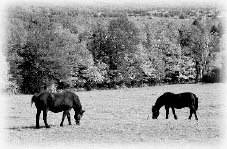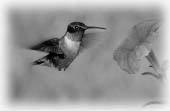|
Three
Days to See
by Helen Keller
Helen
Keller, blind and deaf from infancy, became a successful lecturer,
author and educator with the help of her teacher. In the following
essay, she discussed how people should value their ability
to see.
All of us have read thrilling stories in
which the hero had only a limited and specified time to live.
Sometimes
it was as long as a year; sometimes as short as twenty-four
hours. But always we were interested in discovering
just how the doomed man chose to spend his last days or his
last hours. I speak, of course, of free men who have a choice,
not condemned criminals whose sphere of activities is strictly
delimited.
Such stories set us thinking, wondering what
we should do under similar circumstances. What events, what
experiences, what associations should we crowd into those
last hours as mortal beings? What happiness should we find
in reviewing the past, what regrets?
Sometimes I have thought it would be an excellent
rule to live each day as if we should die tomorrow. Such an
attitude would emphasize sharply the values of life. We should
live each day with a gentleness, a vigor, and a keenness of
appreciation which are often lost when time stretches before
us in the constant panorama of more days and months and years
to come. There are those, of course, who would adopt the
Epicurean motto of "Eat, drink, and be merry;"
but most people would be chastened by the certainty of impending
death.
In stories, the doomed hero is usually saved
at the last minute by some stroke of fortune, but almost always
his sense of values is changed. He becomes more appreciative
of the meaning of life and its permanent spiritual values.
It has often been noted that those who live, or have lived,
in the shadow of death bring a mellow sweetness to everything
they do.
Most of us, however, take life for granted.
We know that one day we must die, but usually we picture that
day as far in the future. When
we are in buoyant health, death is all but unimaginable.
We seldom think of it. The days stretch out in an endless
vista. So we go about our petty tasks, hardly aware of our
listless attitude toward life.
The same lethargy, I am afraid, characterizes
the use of all our faculties and senses. Only the deaf appreciate
hearing, only the blind realize the manifold blessings that
lie in sight. Particularly
does this observation apply to those who have lost sight and
hearing in adult life. But those who have never
suffered impairment of sight or hearing seldom make the fullest
use of these blessed faculties. Their eyes and ears take in
all sights and sounds hazily, without concentration, and with
little appreciation. It is the same old story of not being
grateful for what we have until we lose it, of not being conscious
of health until we are ill.
I have often thought it would be a blessing
if each human being were stricken blind and deaf for a few
days at some time during his early adult life. Darkness would
make him more appreciative of sight; silence would teach him
the joys of sound.
Now
and then I have tested my seeing friends to discover what
they see. Recently I was visited by a very good
friend who had just returned from a long walk in the woods,
and I asked her what she had observed. "Nothing in particular,"
she replied. I might have been incredulous had I not been
accustomed to such responses, for long ago I became convinced
that the seeing see little.
How was it possible, I asked myself, to walk
for an hour through the woods and see nothing worthy of note?
I who cannot see find hundreds of things to interest me through
mere touch. I feel the delicate symmetry of a leaf. I pass
my hands lovingly about the smooth skin of a silver birch,
or the rough shaggy bark of a pine. In spring I touch the
branches of trees hopefully in search of a bud, the first
sign of awakening Nature after her winter's sleep. I feel
the delightful, velvety texture of a flower, and discover
its remarkable convolutions; and something of the miracle
of Nature is revealed to me. Occasionally, if I am very fortunate,
I place my hand gently on a small tree and feel the happy
quiver of a bird in full song. I am delighted to have the
cool water of a brook rush through my open fingers. To me
a lush carpet of pine needles or spongy grass is more welcome
than the most luxurious Persian rug. To me the pageant of
seasons is a thrilling and unending drama, the action of which
streams through my finger tips. 
At times my heart cries out with longing to
see all these things. If I can get so much pleasure from mere
touch, how much more beauty must be revealed by sight. Yet,
those who have eyes apparently see little. The panorama of
colour and action which fills the world is taken for granted.
It is human, perhaps, to appreciate little that which we have
and to long for that which we have not, but it is a great
pity that in the world of light the gift of sight is used
only as a mere convenience rather than as a means of adding
fullness to life.
If I were the president of a university I
should establish a compulsory course in "How to Use Your Eyes".
The professor would try to show his pupils how they could
add joy to their lives by really seeing what passes unnoticed
before them. He
would try to awake their dormant and sluggish faculties.
Suppose you set your mind to work on the problem
of how you would use your own eyes if you had only three more
days to see. If with the oncoming darkness of the third night
you knew that the sun would never rise for you again, how
would you spend those three precious intervening days? What
would you most want to let your gaze rest upon?
 I, naturally, should want most to see the things which have
become dear to me through my years of darkness. You, too,
would want to let your eyes rest long on the things that have
become dear to you so that you could take the memory of them
with you into the night that loomed before you. I, naturally, should want most to see the things which have
become dear to me through my years of darkness. You, too,
would want to let your eyes rest long on the things that have
become dear to you so that you could take the memory of them
with you into the night that loomed before you.
I should want to see the people whose kindness
and gentleness and companionship have made my life worth living.
First I should like to gaze long upon the face of my dear
teacher, Mrs. Anne Sullivan Macy, who came to me when I was
a child and opened the outer world to me. I should want not
merely to see the outline of her face, so that I could cherish
it in my memory, but to study that face and find in it the
living evidence of the sympathetic tenderness and patience
with which she accomplished the difficult tasks of my education.
I should like to see in her eyes that strength of character
which has enabled her to stand firm in the face of difficulties,
and that compassion for all humanity which she has revealed
to me so often.
I do not know what it is to see into the heart
of a friend through that "window of the soul", the eye. I
can only "see" through my finger tips the outline
of a face. I can detect laughter, sorrow, and many other obvious
emotions. I know my friends from the feel of their faces.
But I cannot really picture their personalities by touch.
I know their personalities, of course, through other means,
through the thoughts they express to me, through whatever
of their actions are revealed to me. But I am denied that
deeper understanding of them which I am sure would come through
sight of them through watching their reactions to various
expressed thoughts and circumstances, through noting the immediate
and fleeting reactions of their eyes and countenance.
Friends who are near to me I know well, because
through the months and years they reveal themselves to me
in all their phases; but of causal friends I have only an
incomplete impression, an impression gained from a handclasp,
from spoken words which I take from their lips with my finger
tips, or which they tap into the palm of my hand.
How much easier, how much more satisfying
it is for you who can see to grasp quickly the essential qualities
of another person by watching the subtleties of expression,
the quiver of a muscle, the flutter of a hand. But does it
ever occur to you to use your sight to see into the inner
nature of a friend or acquaintance? Do not most of you seeing
people grasp casually the outward features of a face and let
it go at that?
For instance, can you describe accurately
the faces of five good friends? Some of you can, but many
cannot. As an experiment, I have questioned husbands of long
standing about the color of their wives' eyes, and often they
express embarrassed confusion and admit that they do not know.
And, incidentally, it is a chronic complaint of wives that
their husbands do not notice new dresses, new hats, and changes
in household arrangements.
The
eyes of seeing persons soon become accustomed to the routine
of their surroundings, and they actually see only the startling
and spectacular. But even in viewing the most spectacular
sights the eyes are lazy. Court records reveal every day how
inaccurately "eyewitnesses" see. A given event will be "seen"
in several different ways by as many witnesses. Some see more
than others, but few see everything that is within the range
of their vision.
Oh, the things that I should see if I had
the power of sight for just three days!
(1 634 words)
TOP |
